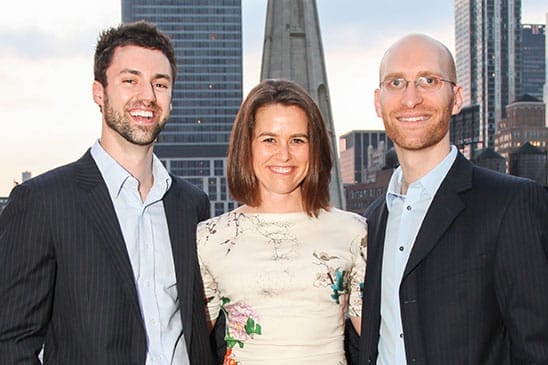For the last three years, Wharton Magazine has spotlighted a number of Wharton startups to watch in its winter issue. We decided to revisit our companies from the 2013 edition—“Startup Enterprise: The Next Generation”—and connected with three of these Wharton startups to see how they are faring and where they are headed.
We’ll publish our interviews with each as a series in the coming two weeks, and we’ll start with CommonBond. Launched on Wharton’s campus in November 2011 by then-MBA students David Klein; Michael Taormina; and Jessup Shean, WG’12, L’12, the financial startup funds and refinances low-cost, fixed-rate loans for graduate students. Its loan pool in large part comes from alumni investors. At the time of our previous interview, CommonBond had raised $3.5 million–$2.5 million from Wharton alumni.
That’s changed since then, as you’ll see in our interview excerpt below:
WHARTON MAGAZINE: What have you been up to since we last spoke?
DAVID KLEIN: We have really been focusing on our borrowers and raising awareness. … We were fortunate enough to announce over $100 million coming onto our platform last year, which gives us a lot of runway to fund and refinance student debt.
We’re running in parallel our continual fundraising efforts to continue to ensure there is always capital on the platform.
WM: Has the startup experience been what you expected?
KLEIN: I think some people have a realistic notion of what the “startup experience” means and others don’t. It’s easy to want to be an entrepreneur for all the wrong reasons, for example.
Some of those wrong reasons include, “I want a more balanced life style.” Well, you’re probably not going to get a more balanced lifestyle as an entrepreneur, certainly not for the first couple years. It will likely be the most intense, stressful work of your life. But it will also probably be the most meaningful work you’ve ever done.
Number two, people might think, “I want more freedom.” Well, as an entrepreneur, you’re not going to get more freedom; you’re going to get more responsibility. You may get more autonomy, but you’re now responsible for so much more than just you.
If you’re still in it after all the myths have been demystified, then the entrepreneurial path is for you.
WM: How have you found the transition from founder to CEO?
KLEIN: I have been co-founder and CEO from the very beginning, so that expectation has always been set. If I could reframe the question a little bit, I think the transition is more about how do you go from a co-founding team of two or three, to running a company that has 15 to 20 employees and now a board of directors, then 100s of and 1000s of customers. I think that’s the transition. How do you create conditions for constant scale and growth?
WM: One piece of advice for students?
KLEIN: Just go out and do it. Push through all the resistance that you will invariably face. Building a company isn’t easy. If you can withstand—even chase—the intensity of it, then your likelihood of entrepreneurial success increases dramatically.
Editor’s note: Come back next week to read our interview with Anuj Kulkarni, who is lighting up India’s roadways with his social enterprise Prajwalbharat. The following week, we will talk with Apu Gupta, WG’05, co-founder of the Philadelphia-based visual analytics firm Curalate.
























